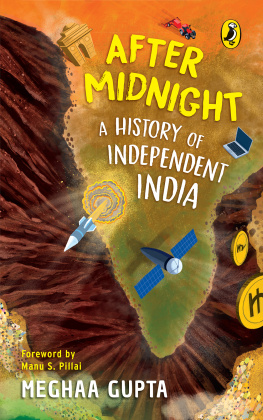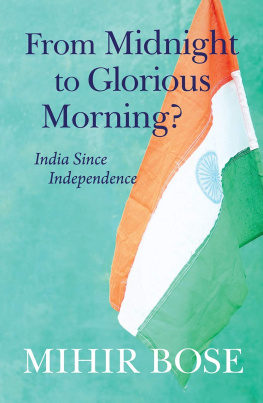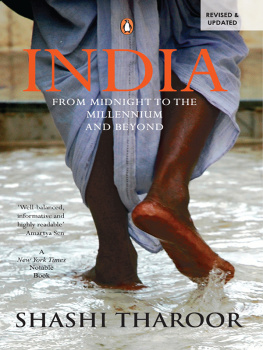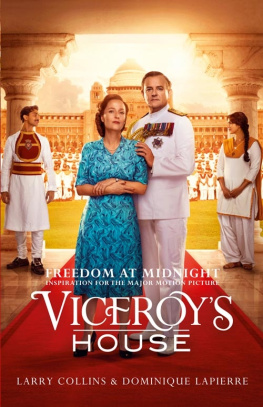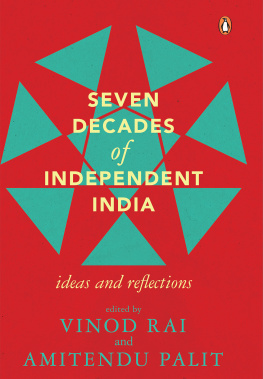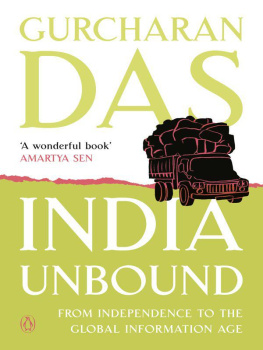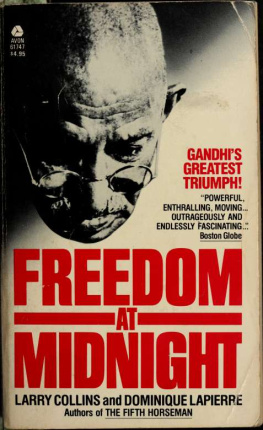I found Meghaas book objective and devoid of jingoism, something that readers of all ages would benefit from reading, despite her strongly held Indian identity and her lived experience as a woman from privilege. To cover key landmark events in one book is a tough task especially given there are so many milestones in what is now the worlds second most populous country. Meghaa delivers despite the challenging job at hand. She examines Indias flaws just as critically as its successes, giving credit where it is due but also reflecting upon its hard realities.
Meghaa Gupta takes her readers on a whistle-stop tour through the pages of Indias history that is illuminating and incisive in equal measure. Drawing its readers in from the very first page, After Midnight is sure to enchant young readers with a fantastic gateway to Indian history.
Foreword
I magine a world without the internet. One where there is no Google, smartphones dont exist, and where most people havent even heard of electricity. It is a world with barely any cars, very bad roads, and a time when news takes days, if not weeks, to travel. Millions of people live in this world, but most of them cant read or write. They are also very different from each otherof different complexions, food habits, regions, religions, languages, and castes. And yet they are also united: by a civilizational history, andas some of their leaders tell themby destiny.
When India was born as a nation-state in 1947, many across the world thought it an experiment doomed to failure. In fact, there were statesmen of great experience and standing within India who too believed the country would not last: it had been kept in one piece by British control, and with the departure of that imperial power, bloodshed and civil war would follow. A great amount of blood did flowin Partition, rioting and more sporadic outbursts of violencebut the nation survived. In a sense, Indias endurance made it a wonder of the twentieth century.
But the journey was not easy to begin with, and every milestone of achievementin science and technology, in military prowess, art, cinemawas also accompanied by many troubling patterns. There was religious animosity, corruption, insurgencies and much else, battles that have not yet been settled. And yet, on the whole, there has been faith in our destiny: India will endure and eventually triumph over its problems. We are still living through that journey. Our time too has its moments of greatness, and seasons of tragedy. And yet we too keep faith.
To write a history of India since Independence is not an easy task. How does one tell the story of a nation? Does one only speak of its achievements, to generate pride among its young? Or does one inform them also of how life is more complicated, exposing them to a healthy dose of sobriety and pragmatism? Meghaa Gupta seeks to strike a balance in After Midnight. This book is neither unvarnished pride, nor cynical criticism: it is, instead, an effort in telling Indias story with honesty and maturity. You will enjoy reading this book, but it will also make you think; it will give you answers while also leaving you, like any good book, with questions.
For example, you might find it striking that in Indias first elections, many women would not even give their names to the governmentthey preferred to be known as wives and mothers of their men. And yet, in the same country, we have since then had a powerful woman Prime Minister, a woman as President, women as heads of political parties and major companies, and at the helm of our space projects. As Meghaa shows us in chapter after chapter, these ironies exist in every aspect of Indias story. They are what make India so distinct, so fascinating and at times even difficult to explain.
To best grasp the book, you must read it with an open mind. Youll read about wars won, and battles lost. It will tell you about the politics of nuclear technology as much as it will about communalism. You will learn about refugees, just as you will of rockets. After all, in a country as large, diverse and complex as India, the story can never be simple. But when you finish reading the book, youll have learned many new things; and of things you already know, youd probably think somewhat differently.
When India became free in 1947, our founding fathers and mothers decided that our diversity and internal differences need not be viewed as a problem; instead, by celebrating that diversity, they transformed it into our strength. That ultimately is the message Meghaa leaves us with: that we may all be different, each one of us, but even so we are little rivulets flowing into the same great ocean. That ocean is called India, and it is yours as much as mine: to love, share, protect, defend and ultimately to understand and comprehend.
Manu S. Pillai
Historian and author
Introduction
W hen I began writing this book, I asked myself, What do I like most about my country and being an Indian? The answer was easy enoughendless diversity. Over the past three and a half decades of my life, Ive travelled extensively across India and lived in three of its four major metrosDelhi, Mumbai and Chennai. Everywhere I went, I found people who were different from me. They looked different. They spoke a different language at home. They followed a different religion. They ate different food... Initially, I felt a little lost and missed the comfort of familiarity.
Differences may seem daunting when you first encounter them. But they can also be deeply enriching. Indias diversity has allowed me to make room for many different things in my life. I speak English and Hindi at home, but Ive also picked up simple words and phrases like Hello, How are you? and Thank you in eight other languages. Ive learned some of them from watching regional cinema or reading translations of regional literature. The others have been taught to me by domestic helpers, auto drivers, shopkeepers, waiters at restaurants... Friends have added a few colourful curse words to this multilingual dictionary! My pronunciation may not always be up to the mark, but every time I meet someone who speaks these languages, I attempt to greet them in their mother tongue. Its a different matter that the results are sometimes hilarious. Ive learnt that some words have gone out of fashion. At times, my pronunciation has changed the meaning of a word entirely!

